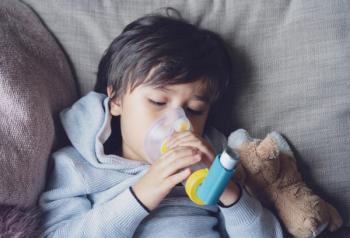
Initiating proton pump inhibitors may increase asthma risk
Often used to treat gastrointestinal concerns in children, proton pump inhibitors are thought to lead to respiratory concerns. A study examines this association.
Increasingly used to treat children with gastroesophageal reflux disease and other gastrointestinal concerns, proton pump inhibitors aren’t without their risks. An
The researchers ran a nationwide cohort study that used registry data in Sweden from January 2007 and December 2016. They matched children and adolescents aged 17 years and younger by both age and propensity score to create pairs of patients who had started using proton pump inhibitors and those who had not used them.
The data supplied 80,870 pairs. The researchers found that the children who started proton pump inhibitors had a higher incidence of asthma (21.8 events per 1000 person-years) when compared to children who did not initiate any proton pump inhibitor drug (14.0 events per 1000 person-years), with hazard ratio (HR) of 1.57 (95% CI, 1.49-1.64). Asthma risk increased significantly across all of the age groups, but was highest among infants and toddlers, with an HR of 1.83 (95% CI, 1.65-2.03) in the group aged younger than 6 months and 1.91 (95% CI, 1.65-2.22) in the group aged 6 months to younger than 2 years (P < .001 for interaction). The researchers also calculated the HRs for individual proton pump inhibitor drugs: 1.64 (95% CI, 1.50-1.79) for esomeprazole, 1.49 (95% CI, 1.25-1.78) for lansoprazole, 1.43 (95% CI, 1.35-1.51) for omeprazole, and 2.33 (95% CI, 1.30-4.18) for pantoprazole. They also looked at the timing of asthma onset following initiation of proton pump inhibitor and found 1.62 (95% CI, 1.42-1.85) for 0 to 90 days, 1.73 (95% CI, 1.52-1.98) for 91 to 180 days, and 1.53 (95% CI, 1.45-1.62) for 181 days to end of follow-up.
The investigators concluded that starting to use proton pump inhibitors was linked to an increased risk of asthma in children. Because of this risk, they said that clinicians should take care to prescribe them only when very clearly indicated, after weighing the benefits against the potential harms.
Reference
1. Wang Y, Wintzell V, Ludvigsson J, Svanström H, Pasternak B. Association between proton pump inhibitor use and risk of asthma in children. JAMA Pediatr. February 8, 2021. Epub ahead of print. doi:10.1001/jamapediatrics.2020.5710
Newsletter
Access practical, evidence-based guidance to support better care for our youngest patients. Join our email list for the latest clinical updates.







